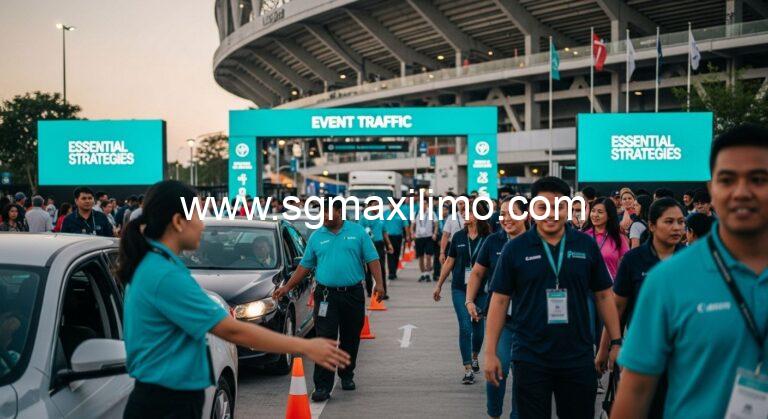Corporate Travel Sustainability Trends and Strategies 2025
Corporate travel is about to look very different. By 2025, 46% of organizations will set strict carbon budgets for each department. Surprised? Most people think sustainability just means planting a few trees or offsetting flights. The reality is, businesses are turning to AI-powered tools, real-time tracking, and digital meetings, completely flipping what business trips mean…
Corporate travel is about to look very different. By 2025, 46% of organizations will set strict carbon budgets for each department. Surprised? Most people think sustainability just means planting a few trees or offsetting flights. The reality is, businesses are turning to AI-powered tools, real-time tracking, and digital meetings, completely flipping what business trips mean and forcing every traveler to rethink their routines.
Table of Contents
- Understanding Corporate Travel Sustainability
- Key Strategies For Greener Business Trips
- Practical Solutions For Diverse Traveler Needs
- Innovative Approaches For Sustainable Events And Meetings
Quick Summary
| Takeaway | Explanation |
|---|---|
| Implement Carbon Budgets by 2025 | Businesses will allocate specific carbon budgets to departments, influencing travel planning and promoting accountability. |
| Adopt Advanced Technology for Sustainability | Utilize AI and real-time tracking to enhance travel efficiency while minimizing carbon footprints. |
| Personalize Sustainability Approaches | Create adaptable frameworks that empower employees to make informed, sustainable travel choices tailored to their needs. |
| Prioritize Sustainable Supplier Partnerships | Choose travel partners committed to environmental practices, ensuring that all aspects of travel reflect sustainability values. |
| Embrace Digital and Hybrid Events | Leverage technology to reduce onsite gatherings, thereby lowering overall carbon emissions associated with events and meetings. |
Understanding Corporate Travel Sustainability
Corporate travel sustainability has transformed from a peripheral concept to a critical strategic imperative for businesses worldwide. As organizations recognize their environmental responsibilities, sustainable travel practices have become a key mechanism for reducing carbon footprints and demonstrating corporate social responsibility.
The Evolution of Sustainable Corporate Travel
The landscape of corporate travel is undergoing a significant transformation driven by environmental consciousness and technological innovation. Research from Strategic Edge Research reveals that by 2025, 46% of organizations will implement carbon budgets for departments, fundamentally reshaping how businesses approach travel planning.
Companies are no longer viewing sustainability as an optional strategy but as a core business requirement. This shift is evident in the growing adoption of comprehensive sustainability frameworks that integrate environmental considerations into every aspect of corporate travel decision making. The approach goes beyond simple carbon offsetting to include holistic strategies that minimize environmental impact while maintaining operational efficiency.
Technology and Strategic Sustainability
Technological innovations are playing a pivotal role in enabling corporate travel sustainability. Cutting edge booking platforms now incorporate advanced carbon calculators and artificial intelligence algorithms that optimize travel itineraries for minimal environmental impact. According to the Business Travel Show Europe, 60% of corporate travel buyers believe sustainable business travel is achievable through strategic technological interventions.
Key technological strategies include:
- Real time carbon tracking systems that provide immediate insights into travel emissions
- AI powered route optimization to reduce unnecessary travel and select most environmentally friendly transportation options
- Digital collaboration tools that can replace certain in person meetings
Strategic Supplier Partnerships
Sustainability in corporate travel extends beyond internal policies to encompass strategic partnerships with travel suppliers. Organizations are increasingly selecting airlines, hotels, and transportation providers based on their demonstrated commitment to environmental sustainability. This includes prioritizing suppliers with verifiable green certifications, investments in sustainable aviation fuel, and comprehensive carbon reduction initiatives.
The trend reflects a broader understanding that corporate travel sustainability is a collaborative effort requiring commitment from all stakeholders in the travel ecosystem. Companies are recognizing that their travel choices have far reaching environmental implications and are taking proactive steps to create meaningful change.
As we move toward 2025, corporate travel sustainability will continue to evolve from a compliance requirement to a competitive differentiator. Organizations that successfully integrate sustainable practices will not only reduce their environmental impact but also appeal to environmentally conscious stakeholders and employees.
Key Strategies for Greener Business Trips
Greener business trips represent a strategic approach to reducing corporate environmental impact while maintaining operational effectiveness. Organizations are increasingly developing comprehensive strategies that transform traditional travel practices into sustainable, environmentally conscious approaches.
Minimizing Travel and Maximizing Efficiency
According to the Global Business Travel Association, reducing unnecessary travel remains a critical strategy for sustainable corporate mobility. Companies are implementing sophisticated approaches to minimize travel while maintaining productive business interactions.
Practical strategies include:
- Virtual meeting technologies that replace physical travel
- Trip consolidation techniques combining multiple objectives into single journeys
- Strategic travel planning that prioritizes essential in person interactions
Organizations are leveraging advanced technologies and data analytics to evaluate travel necessity. Artificial intelligence and machine learning algorithms help companies determine which meetings genuinely require physical presence and which can be effectively conducted through digital platforms.
Sustainable Transportation Choices
Research from the IMD Future Readiness Indicator highlights that 78% of travelers prefer companies with strong sustainability policies. This preference is driving companies to make more environmentally conscious transportation selections.
Key transportation strategies include:
- Prioritizing public transportation for shorter business trips
- Selecting electric or hybrid vehicle options for ground transportation
- Choosing airlines with robust carbon reduction programs
- Encouraging rail travel as an alternative to short haul flights
Companies are developing comprehensive transportation guidelines that provide clear frameworks for employees to make sustainable travel decisions. These guidelines often include carbon impact calculators and incentive programs that reward environmentally friendly travel choices.
Carbon Offsetting and Strategic Investments
Beyond reducing travel, organizations are investing in comprehensive carbon offsetting programs. Corporate travel sustainability now involves active investment in environmental restoration and renewable energy projects that neutralize travel related emissions.
Strategic carbon offsetting approaches include:
- Direct investments in renewable energy projects
- Supporting reforestation and conservation initiatives
- Purchasing verified carbon credits
- Funding sustainable aviation fuel development
Progressive companies are transforming carbon offsetting from a passive compliance activity into a proactive environmental strategy. By selecting high quality, verified offset programs, businesses can demonstrate genuine commitment to sustainability while supporting global environmental restoration efforts.
As corporate travel continues evolving, sustainability will become an increasingly integral component of business strategy. Organizations that embrace these comprehensive approaches will not only reduce their environmental footprint but also position themselves as responsible, forward thinking entities in an increasingly environmentally conscious global marketplace.
Practical Solutions for Diverse Traveler Needs
Corporate travel sustainability must accommodate the complex and varied needs of modern business travelers. Organizations are developing innovative approaches that balance environmental responsibility with individual traveler requirements, recognizing that a one size fits all strategy cannot effectively address the diverse landscape of business mobility.
Personalized Sustainability Frameworks
According to research from Strategic Edge Research, 46% of organizations are implementing carbon budgets for departments, creating more personalized and flexible sustainability approaches. These frameworks allow individual travelers and departments to make informed decisions about their travel environmental impact while maintaining operational flexibility.
Key elements of personalized sustainability frameworks include:
- Customizable carbon tracking that provides individual travelers transparency
- Flexible travel policy guidelines that accommodate different business needs
- Incentive programs rewarding sustainable travel choices
By empowering travelers with information and choices, companies are transforming sustainability from a top down mandate to a collaborative effort. Travelers become active participants in reducing environmental impact rather than passive recipients of rigid policies.
Technology Enabled Traveler Support
Research from the Business Travel Show Europe reveals that 37% of corporate travel buyers are incorporating policies aimed at improving travelers’ overall experience and well-being. Advanced technological solutions are playing a crucial role in supporting diverse traveler needs while maintaining sustainability goals.
Technological innovations supporting traveler needs include:
- AI powered travel recommendation engines that suggest sustainable alternatives
- Real time carbon impact calculators integrated into booking platforms
- Multilingual support systems for international travelers
- Accessibility features for travelers with special requirements
These technologies create a more inclusive and supportive travel ecosystem that considers individual preferences and constraints while maintaining a strong commitment to environmental sustainability.
Holistic Wellness and Sustainability Integration
Modern corporate travel strategies are moving beyond simple carbon reduction to integrate traveler wellness and environmental responsibility. Companies recognize that sustainable travel is not just about reducing emissions but also about creating positive experiences that support employee health and productivity.
Holistic approaches include:
- Mental health support for frequent travelers
- Ergonomic travel recommendations
- Stress reduction strategies during business trips
- Sustainable accommodations that prioritize traveler comfort
By addressing the comprehensive needs of travelers, organizations are creating more meaningful and effective sustainability strategies. These approaches recognize that successful corporate travel sustainability requires a human centered design that balances environmental goals with individual well being.
As businesses continue to evolve, the integration of technology, personalization, and holistic wellness will become increasingly critical in developing sustainable travel solutions that meet the complex needs of modern professionals. The future of corporate travel lies in creating flexible, supportive, and environmentally responsible mobility strategies that empower travelers while protecting our planet.
Innovative Approaches for Sustainable Events and Meetings
As corporate sustainability becomes increasingly critical, organizations are reimagining event and meeting strategies to minimize environmental impact while maintaining productivity and engagement. The transformation goes beyond traditional approaches, integrating technology, strategic planning, and innovative design to create more sustainable gathering experiences.
Digital and Hybrid Event Strategies
According to Cvent’s analysis, organizations are experiencing a significant shift towards digital and hybrid event models that dramatically reduce carbon footprints. These approaches leverage advanced technologies to create immersive, interactive experiences that minimize physical travel and resource consumption.
Key digital event strategies include:
- Virtual reality conference platforms enabling global participation
- Advanced streaming technologies for high quality remote interactions
- Interactive digital collaboration tools that replicate in person engagement
- AI powered networking mechanisms for meaningful digital connections
By embracing these technologies, companies can significantly reduce travel related emissions while maintaining robust professional networking and knowledge sharing opportunities. The digital transformation allows organizations to create more inclusive, accessible, and environmentally responsible event experiences.
Sustainable Venue and Resource Management
Research from American Meetings, Inc. emphasizes the critical role of venue selection and resource management in creating sustainable events. Organizations are developing comprehensive frameworks that evaluate venues and event resources through an environmental sustainability lens.
Sustainable venue management approaches include:
- Green certified event spaces with verified environmental credentials
- Local vendor partnerships to reduce transportation emissions
- Zero waste catering strategies
- Energy efficient venue selection
- Comprehensive recycling and waste reduction programs
Companies are moving beyond simple carbon offsetting to create holistic sustainability strategies that consider every aspect of event design and execution. This approach transforms events from potential environmental burdens into opportunities for demonstrating corporate environmental responsibility.
Technological Carbon Tracking and Reporting
Hilton’s 2025 Trends Report introduces advanced platforms like the LightStay system, which enables precise measurement and management of event environmental footprints. These technological solutions provide unprecedented transparency and accountability in sustainable event planning.
Innovative carbon tracking technologies offer:
- Real time environmental impact calculations
- Detailed emissions reporting
- Predictive modeling for potential sustainability improvements
- Comprehensive documentation for corporate sustainability reports
These technologies empower event planners to make data driven decisions, transforming sustainability from an abstract concept into a measurable, manageable aspect of event design. By providing clear metrics and actionable insights, organizations can continuously refine and improve their environmental strategies.
As we move toward 2025, sustainable events and meetings will become increasingly sophisticated, blending technological innovation, strategic planning, and genuine environmental commitment. Organizations that embrace these comprehensive approaches will not only reduce their ecological impact but also demonstrate leadership in corporate sustainability.
Here is a comparison table summarizing the different sustainable transportation options for corporate travelers, as discussed in the article.
| Transportation Option | Sustainability Feature | Example Use Case |
|---|---|---|
| Public Transportation | Lower emissions per traveler | Intra-city commutes, short trips |
| Electric/Hybrid Vehicles | Reduced carbon footprint for ground travel | Car rentals, shuttle services |
| Airlines with Carbon Programs | Investments in carbon reduction/SAF | Long-distance flights |
| Rail Travel | Lower emissions than short-haul flights | Regional business travel |
The following summary table organizes the carbon offsetting and investment strategies mentioned for greener business trips.
| Carbon Offsetting Strategy | Description |
|---|---|
| Renewable Energy Investments | Funding projects that generate clean energy |
| Reforestation & Conservation | Supporting tree planting and biodiversity efforts |
| Verified Carbon Credits | Purchasing third-party verified offsets |
| Sustainable Aviation Fuel Development | Directly supporting eco-friendly jet fuel programs |
Frequently Asked Questions
What are the key trends in corporate travel sustainability by 2025?
By 2025, significant trends include the implementation of carbon budgets by organizations, increased use of AI and technology for travel efficiency, personalized sustainability frameworks for employees, and a shift towards digital and hybrid events to reduce carbon emissions associated with travel.
How can companies minimize travel while maintaining productivity?
Companies can minimize travel by adopting virtual meeting technologies, consolidating trips for multiple objectives, and using data analytics to determine the necessity of physical presence for meetings.
What transportation options are considered sustainable for business travel?
Sustainable transportation options include public transportation for shorter trips, electric or hybrid vehicles for ground travel, airlines with carbon reduction programs, and rail travel as an alternative to short flights.
What strategies exist for carbon offsetting in corporate travel?
Organizations can engage in carbon offsetting through investments in renewable energy projects, supporting reforestation and conservation initiatives, purchasing verified carbon credits, and developing sustainable aviation fuel programs.
Make Sustainability a Reality for Your Corporate Travel in Singapore
Is your team facing the pressure of new carbon budgets and the expectation to adopt greener business travel by 2025? As organizations move from talking about sustainability to making it part of their daily operations, reliable and eco-conscious transportation choices have become more important than ever. The article highlights the urgent need to minimize emissions, offer flexibility, and support diverse traveler needs including wheelchair-accessible vehicles and group bookings. If you are tasked with streamlining corporate mobility while demonstrating real commitment to environmental and social responsibility, choosing the right ground transport partner is a decisive step.
Explore how SG Maxi Limo can support your sustainability strategy. Select from a range of options including spacious 13-seater maxi cabs, VIP limousines, and minibuses for group transfers. Simplify your organization’s effort to track and manage carbon-conscious transport for airport pickups, corporate events, or special requirements. It is time to make sustainable travel effortless for your team. Book with confidence and see the difference for your next corporate journey at https://sgmaxilimo.com.









